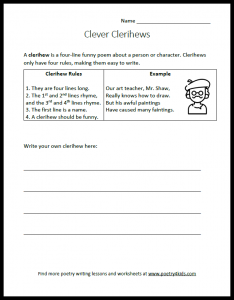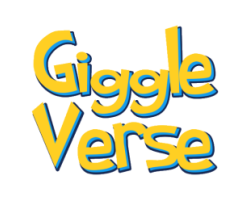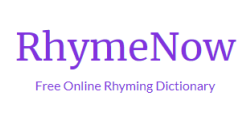Funny poems are enjoyable to read. The more a poem makes you laugh, the more fun it is to read. This doesn’t mean that a poem has to be funny to be good. Nor does it mean that funny poems are better than serious poems. There are lots of very good poems that are not funny at all. But if you are trying to write a funny poem, the funnier you can make it, the better it will be.
If you have been wondering how you can make your poems funny, you will be glad to know that there are some very easy ways to do it. In this chapter, I show you several different ways that you can make your poems funny. These include:
- using a “surprise ending”
- exaggerating
- using opposites
- putting your idea in an unusual place
- using funny words
- a special type of wordplay known as a “pun”
- a combination of the above
Each of these is a different method you can use to get your reader to laugh. First, let me show you the surprise ending.
The Surprise Ending
There are lots of different ways to make a poem funny, but they all rely on one thing: the “element of surprise”. A funny poem is like a joke or a riddle that rhymes. For a joke or funny poem to be a good one, it has to surprise the reader with something they don’t expect. When they get to the end of a poem and suddenly find a surprising twist or unexpected “punch line”, it can really make them giggle. Look at the following example:
Seven, Six and Nine
Seven, Six and Nine
all sat down to dine.
Now Six is scared of Seven
because Seven ate Nine.
This is an old joke, told in the form of a poem. Hopefully it made you laugh or at least smile. A couple of things make this poem funny. First, the reader knows that the three numbers, 7, 6 and 9 are going to eat dinner (or dine), but the reader probably does not expect that 7 is going to “eat” 9. So when the reader sees the last line, it is a surprise. Second, the reader has heard the numbers “7, 8, 9” many times, but has probably always thought of them as “seven eight nine”, and not as “seven ate nine”. This shows the reader something familiar in a surprising new way. Seeing something in a way that you have never noticed before can also be quite surprising. The combination of these two surprises can startle the reader and make them laugh.
So how can you use this knowledge to make your own poems funny? Here’s one way: After you select a topic for your poem, ask yourself “what’s funny about that?” Try to come up with as many things as you can that might be funny about your topic. Each time you think of something that seems funny, write it down! After you write down everything you can think of, you will have a list of funny ideas to choose from. You can then choose the funniest idea on your list and use it as your surprise ending.
For example, let’s say you decide to write a poem about a bee. Ask yourself “what’s funny about a bee?” When I think about bees, I think of several things. They are colored with yellow and black stripes. They sting people when they are angry. They fly and make a buzzing noise. They make honey and honeycomb. And so on.
So here are several ideas for funny poems. Write a poem about:
- a bee that is purple and green instead of yellow and black
- a bee that never takes a bath because it thinks it is supposed to “stink” instead of “sting”
- a bee that can’t fly so it takes the bus instead
- a bee that makes a honking noise instead of a buzzing sound
- a bee that uses honeycomb to comb its hair
I like the last idea best, so I am going to write a poem about a bee that combs its hair with honeycomb. This will be the “surprise ending” of the poem – the thing that makes the poem funny – so I will save this for the end of the poem.
Here is the most important rule to making a poem funny. If your poem has a surprise, save the surprise for the end of the poem. If you start the poem by saying that the bee combs its hair with honeycomb, you may have nothing else to say. That would be like telling the punch line of a joke at the beginning of the joke instead of the end. On the other hand, if you save your surprise for the end, you can start the poem by telling all about the bee and then make the reader laugh at the end.
I promised you I would write a poem about a bee that combs its hair with honeycomb, so here it is.
Pete the Sweet Bee
There was a bee
named Sweetie Pete.
His hair was slick
he smelled so sweet.
He’d take a bath
each day at home.
Then comb his hair
with honeycomb.
Finding a Funny Idea
As I mentioned above, a good way to make a poem funny is to ask yourself the question “what’s funny about that?” If you are going to write a poem about an eagle, ask yourself “what’s funny about an eagle?”
Here is one possible answer: One well-known type of eagle is the “bald eagle”. What if there was a bald eagle that had lost all the feathers on his head, so it was actually bald? What if the eagle was embarrassed about it and thought that it should buy a wig or a toupee so people would not know it was bald?
Here is another possible answer: what if, when its mother said it was an “eagle”, it thought she said “beagle” and so it thought it was a dog?
And here is yet another possible answer: Eagles are known for building very large nests. What if this eagle didn’t know when to stop building, and ended up with a nest larger than a baseball stadium, or a taller than the Empire State Building?
As you can see, there are plenty of different ways to answer the question “what’s funny about that?” In the first example above, I looked at the name “bald eagle” to see what I could do with the word “bald”. In the second example, I looked to see what I could do with the word “eagle”. In the third example, I took a characteristic of eagles and exaggerated it.
Let’s try doing the same thing with an alligator. Alligator rhymes with elevator, so perhaps you could write a poem about an alligator that likes to ride the elevator. Alligators also have lots of teeth, so maybe you could write about an alligator that didn’t brush his teeth and had a hundred and forty seven cavities. Alligators are very mean creatures, so you could write a poem about a kind-hearted alligator that was sad because everyone thought it was mean.
Before you start writing your funny poem, see if you can come up with three or four different answers to the question “what’s funny about that?” Write down each of your ideas and then pick the one that you think is the funniest.
In each of the following sections, I will show you different techniques you can use to create funny ideas.
Exaggeration
One common technique for making poems funny is to exaggerate. Exaggeration means taking a characteristic of your subject and making it bigger or more extreme than normal. A bicycle that can go a thousand miles an hour; a teacher that assigns a hundred hours of homework every day; cafeteria food that tastes worse than sewage; a dog is so smart he can speak five languages; these are all examples of exaggeration.
The children’s poet Jack Prelutsky wrote a book of poetry entitled A Pizza the Size of the Sun. Jack Prelutsky is widely known for his use of exaggeration, and this book title is just one example. A real pizza usually has to be small enough to fit on a table or inside a pizza box. Saying that the pizza is much larger than normal is one way of exaggerating about it. Saying that the pizza is as large as the sun is an extreme exaggeration.
So how can you use exaggeration to make your poems funny? First, write down as many characteristics of your subject as you can. Then for each characteristic on your list, write down different ways to exaggerate it.
Here is an example. Let’s say that we are going to write a poem about playing basketball. You could exaggerate by saying that all the players on the other team were twelve feet tall. You could claim to be the best (or worst) basketball player on the planet (or in the entire universe, for that matter). Your could say that the game was so long, it took three years to finish. And so on. Each of these exaggerates one feature of the game.
Let’s try another example. Let’s say you want to write a poem about bubble gum. You could write about blowing a bubble bigger than the state of Nebraska. You could write about getting the world’s stickiest bubble gum stuck to your shoe; stickier than Krazy Glue, goopier than honey, and so on. Each of these ideas takes one characteristic of bubble gum and exaggerates it.
As you can see, exaggeration is an easy way to take any topic and make it funny.
Opposites
Another way to make something funny is to give it characteristics that are the opposite of what you would expect such as:
- a tiny elephant or a giant hummingbird
- a fast turtle or a slow race car
- a friendly monster or a mean kitten
- a stinky rose or a sweet smelling skunk
To find a funny opposite, first choose an idea to write about. Let’s say you decide to write a poem about an alarm clock. What do you know about alarm clocks? One thing is that they tell you what time it is, and the other thing is that they are usually very loud. The opposites of these would be an alarm clock that always told the wrong time, or an alarm clock that was so quiet, nobody could hear it.
Or maybe you would like to write a poem about an alien from outer space. People usually think of aliens as “little green men” with antennae on their heads, and maybe with three eyes, four hands, and so on. The opposite of this might be to write about an alien that looked exactly like a human being, with two eyes, one head, two hands, etc. For example, you might write about a UFO that landed in your back yard, and the aliens that came out looked exactly like your sister, or your teacher, or the President of the United States.
Using opposites in this way can make it easy for you to come up with funny ideas for poems.
Unusual Places
Setting your poem in an unusual place is sort of like using opposites. But instead of finding the opposite of a characteristic, you simply place your idea in a place where no one would expect it.
For example, you would not expect to go fishing, or surfing or swimming somewhere where there is no water, such as in the middle of the street or the Sahara desert. If you were writing a poem about fishing, you could make it funny by setting it in one of these places.
Here are some other examples:
- a bald eagle in a barber shop
- a cowboy in a ballet
- a snowman in the desert
- a fish in an airplane
- a plate of spinach in a candy shop
- playing tennis in a swimming pool
Whatever your idea – whether you are going to write about baseball game, a polar bear, your favorite food, or just about anything else – try putting it in an unusual place and you may have the beginning of a very funny poem.
Using Funny Words
I think some words are just funny all by themselves. In the notebook where I jot down my poem ideas, I also keep a list of words that strike me as funny. Sometimes I will write an entire poem just so I can use a single word like “blubbery” or “succotash” or “flapdoodle” or “snorkel.”
While you can’t always write whole poems around a single funny word like this, you can often choose to use a funny word instead of plain one. For example, if you are writing about someone walking down the street, it is funnier to say they “waddled” down the street or “stumbled” down the street than to say they “walked” down the street. If you are writing about someone crying, it might be funnier to say they are “blubbering” than to say they were “crying.”
Using funny words may not be the main thing that makes your poem funny, but it can make the difference between a so-so poem and a really funny poem, because funny words can keep the reader smiling or giggling throughout the poem until you get to the punch line at the end.
So, whenever you have a choice to use one of several words to describe something, ask yourself which word sounds the funniest and try to use that one rather than the plainer words.
Are We Having Pun Yet?
Many jokes and riddles involves a special type of word play called a “pun”. There are actually several different types of puns, but they all contain a word that has two different meanings. For example:
Q: What kind of knots do you tie in outer space?
A: Astronauts.Q: Where do fish keep their money?
A: In a river bank.
As you can see in each of these riddles, one of the words has more than one meaning. “Astronauts” has the sound of the word “knots” in it, and a bank is both a place to keep your money and the side of a river.
Puns can be used at the end of a poem for your “punch line,” or they can be used throughout the poem, as in this example:
The Hungry Little Giant
“I’m hungry! I could swallow Wales!”
the little giant cried.
“Tonight we’re having Chile, dear,”
the giant’s mother sighed.
“Can I please have Samoa, Mom?”
the little giant asked her.
“Just don’t forget dessert,” she said.
“We’re having Baked Alaska.”
“Tomorrow we’ll eat Turkey,
there is truly nothing finer.
We’ll cook it in the oven and
we’ll serve it up on China.”
There are actually five different types of puns, and you can use any of these in your poems:
- A word that has two different meanings, such as the word “bank” in the riddle above.
- A word that sounds exactly like a word with a different meaning, such as “ate” and “eight.”
- A word that sounds similar to a word with a different meaning, such as “waiting” and “wading” or “fun” and “pun.”
- Words that are combined or “melded” to form a new word such as “rhinocerusted,” “hippopotamustard,” or “pelicannot.”
- A special type of pun called a “spoonerism,” in which parts of words are swapped, such as “bad salad” and “sad ballad.”
You don’t need to learn all of these, but it’s nice to know they are available to use. The more techniques you know for writing funny poems, the easier it will become.
One or More of the Above
To make a poem as funny as possible, try using a combination of the above. For example, try writing a poem with a surprise ending, funny words, a play on words, and opposites, exaggeration or an unusual setting. For example, the following poem, The Cow Town Ballet has a surprise ending, a play on words, and an unusual setting (cows in the ballet).
The Cow Town Ballet
This here is the story of Jed Beaudelay,
who once was the head of the Cow Town Ballet,
the greatest of all of the old western sights,
for Jed would take milk cows and dress them in tights.In tutus and slippers his cows would sashay,
they’d spin pirouettes, they’d glissade and plié.
And cowpokes from Boston to Monterey Bay
would journey to Cow Town to see the ballet.And every night how his cattle would dance!
They’d act out a musical cattle romance,
with skill and precision, with grace and with flair,
they’d glide ‘cross the stage and they’d leap through the air.And when it was over the cowpokes would cheer
and even the manliest men shed a tear
for nowhere on Earth but the Cow Town Ballet
had anyone ever seen cattle sashay.Old Jed Beaudelay would still run the ballet,
if not for the fact that when cattle sashay,
and all of their tutus are flapping around
their costumes make sort of a shuffling sound.And some no-good cowpoke, on hearing that sound,
grew rather unhappy; he stopped and he frowned,
then ran to the sheriff, deciding to tattle,
so Jed was arrested for rustling cattle.
So you see, there are lots of different techniques you can use for making your poems funny. In addition to these special techniques for making any poem funny, there are a few special types of poems, such the funny “list poem,” that you can write. In Chapter 5 I will show you how to write some of the more common types of funny poems, including “list poems,” “opposite poems,” and “repetition poems.”
- Update to Poems-by-Length Page - April 18, 2024
- Create Your Own Poetic Puppet Show - April 16, 2024
- Leap into Laughter with “A Festival for Frogs” - March 26, 2024







